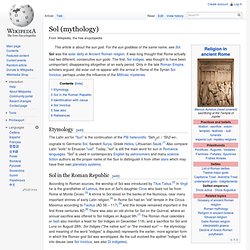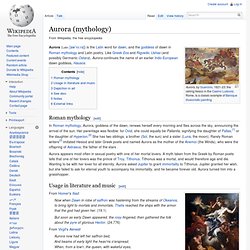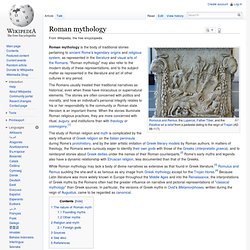

Sol (mythology) Sol was the solar deity in Ancient Roman religion.

It was long thought that Rome actually had two different, consecutive sun gods. The first, Sol Indiges, was thought to have been unimportant, disappearing altogether at an early period. Only in the late Roman Empire, scholars argued, did solar cult re-appear with the arrival in Rome of the Syrian Sol Invictus, perhaps under the influence of the Mithraic mysteries. Sol Invictus ("Unconquered Sun") was long thought to have been a Greek state-supported sun god introduced from Asia Minor by the emperor Aurelian in 274 and overshadowing other Eastern cults in importance,[9] until the abolition of Classical Roman religion under Theodosius I.
There is some debate over the significance of the date December 21 for the cult of Sol. The official status of the cult of Sol after Aurelian was significant, but there is no evidence that it was the supreme cult of the state. Jump up ^ see e.g. Elagabalus (deity) Elagabalus or Heliogabalus is a Syro-Roman sun god.

The temple at Emesa, containing the holy stone, on the reverse of this bronze coin by Roman usurperUranius. The cult statue was brought to Rome by the Emperor Marcus Aurelius Antoninus, who before his accession was the hereditary high priest at Emesa and is commonly called Elagabalus after the deity.[3] The Syrian deity was assimilated with the Roman sun god known as Sol Invictus ("the Undefeated Sun").[4] A temple called the Elagabalium was built on the east face of the Palatine Hill, to house the holy stone of the Emesa temple, a black conical meteorite.[5] Herodian writes of that stone: This stone is worshipped as though it were sent from heaven; on it there are some small projecting pieces and markings that are pointed out, which the people would like to believe are a rough picture of the sun, because this is how they see them.[6] Roman aureus depicting Elagabalus.
Aurora (mythology) Aurora (Latin: [awˈroːra]) is the Latin word for dawn, and the goddess of dawn in Roman mythology and Latin poetry.

Like Greek Eos and Rigvedic Ushas (and possibly Germanic Ostara), Aurora continues the name of an earlier Indo-European dawn goddess, Hausos. From Homer's Iliad: From Virgil's Aeneid: Aurora now had left her saffron bed, And beams of early light the heav'ns o'erspread, When, from a tow'r, the queen, with wakeful eyes, Saw day point upward from the rosy skies. In Shakespeare's Romeo and Juliet (I.i), Montague says of his lovesick son Romeo But all so soon as the all-cheering sun Should in the furthest east begin to draw The shady curtains from Aurora's bed, Away from the light steals home my heavy son... In the poem "Tithonus" by Alfred, Lord Tennyson, Aurora is described thus: Once more the old mysterious glimmer steals From thy pure brows, and from thy shoulders pure, And bosom beating with a heart renewed.
Thy cheek begins to redden through the gloom, Aurora Goddess sparkle. Roman mythology. Roman mythology is the body of traditional stories pertaining to ancient Rome's legendary origins and religious system, as represented in the literature and visual arts of the Romans.

"Roman mythology" may also refer to the modern study of these representations, and to the subject matter as represented in the literature and art of other cultures in any period. The Romans usually treated their traditional narratives as historical, even when these have miraculous or supernatural elements. The stories are often concerned with politics and morality, and how an individual's personal integrity relates to his or her responsibility to the community or Roman state.
Heroism is an important theme. When the stories illuminate Roman religious practices, they are more concerned with ritual, augury, and institutions than with theology or cosmogony.[1] The nature of Roman myth[edit] Founding myths[edit] Other myths[edit] Mucius Scaevola in the Presence of Lars Porsenna (early 1640s) by Matthias Stom.